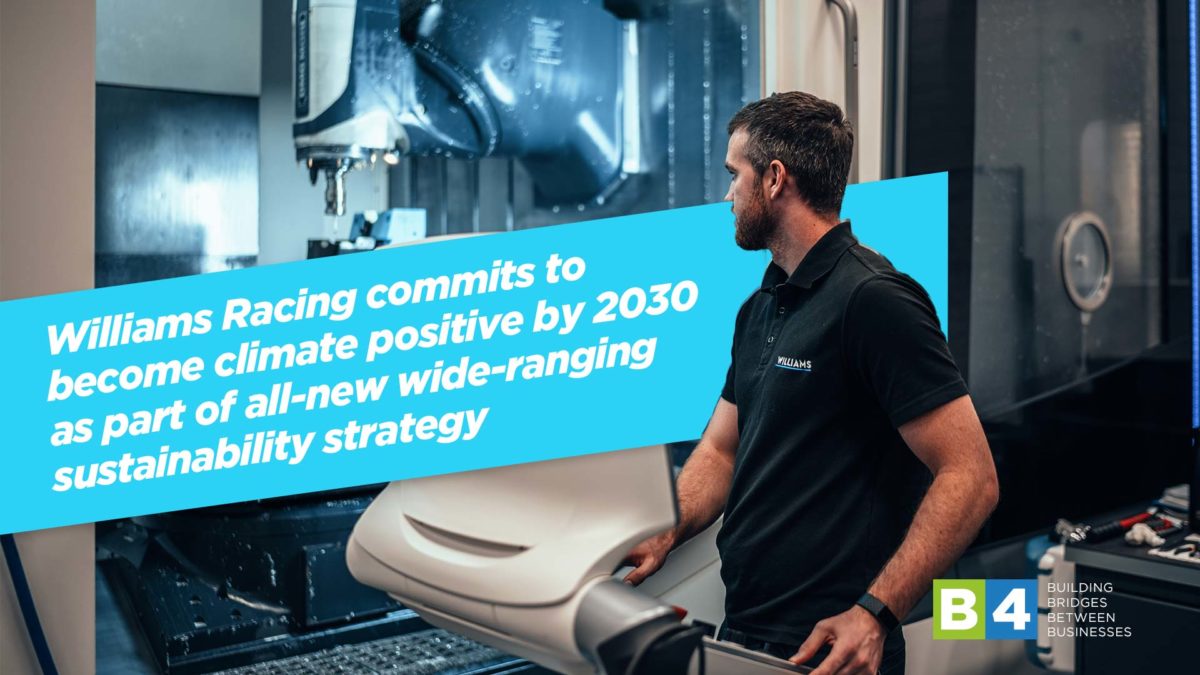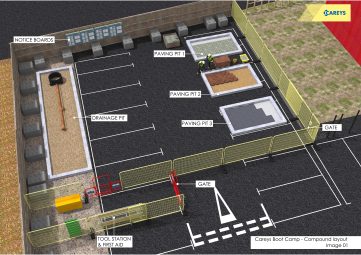
Williams Racing commits to become climate positive by 2030 as part of all-new wide-ranging sustainability strategy
Williams Racing, one of the most successful teams in Formula One history, commits to a far-reaching climate change target. Building on the progress the global motorsport industry has made on sustainability in recent years, Williams Racing goes further than any other race team or motor racing series in the world, to commit to becoming climate positive by 2030.
• One of the most successful Formula One teams in the world commits to be climate positive by 2030
• Williams Racing launches comprehensive purpose driven Sustainability Strategy to tackle key environmental and societal challenges facing motorsport, global sport and the planet
• Sustainability strategy developed over the course of the last year after detailed analysis, aligned with key global initiatives such as UN Climate Change Agenda and UN Sustainability Development Goals
• Williams Racing is now a signatory of the UNFCCC Sports for Climate Action Framework and has recently gained FIA Three-star environmental accreditation
• Williams has a strong heritage in transferring Formula One technology to the EV and sustainable transport and energy sectors, to create technological solutions which contribute towards addressing the problems facing our planet
To achieve this ambitious goal, Williams Racing has developed a series of robust technological and data driven initiatives, as part of a comprehensive purpose driven sustainability strategy, aiming to address some of the most important environmental and societal challenges facing Formula One, global sport and the planet.
The Williams Racing Sustainability Strategy, which has been developed over the course of the last year after extensive expert analysis, is based around five key pillars: Climate Action, Biodiversity Stewardship, Sustainable Innovation, Industry Access for All and Purpose Driven Leadership. Each pillar defines actions that Williams will be taking in the short and medium term to accelerate the transition to a better planet. Adding further transparency and accountability, each objective will be measured, audited and annually reported.
Williams is committed to learning and sharing best practices from all sectors and adhering to international initiatives. Accordingly, this strategy brings its emissions reduction target in line with the below 2 degrees Celsius target of the Paris Climate Agreement and UN Climate Change Global Agenda. Williams Racing is now the first Formula One Team to be a signatory of the UNFCCC, UN Sports for Climate Action Framework. In addition, Williams Racing Sustainability objectives are aligned with 12 of the 17 United Nations Development Goals (SDGs). Williams Racing is also aligned with industry specific standards and has recently gained FIA Three-star environmental accreditation.
Jost Capito, CEO, Williams Racing: “Williams Racing is a pioneer in Formula One and the racing world and has a strong heritage developing Formula One technology and transferring it to the EV and sustainable transport and energy sectors. We are living in a time when our planet and society is changing faster than ever. Building on the progress the global motorsport industry has made on sustainability in recent years, we have taken time to thoroughly analyse our entire operation and develop a comprehensive purpose driven, Sustainability Strategy to accelerate our sustainable transformation. As a team, we wanted to push the envelope and be the pace setter for sustainability in global motorsport and in the wider automotive industry. So today we are making the commitment to be climate positive by 2030 and we will be using our knowledge to nurture and develop advanced technology to meet this goal.
“We know where we are strong and understand where improvement is required and we are open to learning from others and sharing best practices in pursuit of our ambitious objectives. To help raise the baseline of sustainable performance in our industry, we welcome interaction and partnerships with key motorsport stakeholders, automotive companies, brands and organisations who share our vision.”
“As a huge global sporting platform, Formula One has the power to inspire millions of people across the world and as the pinnacle of so many advanced technologies, Formula One has the ability to create technical solutions to help tackle the challenges we face as a planet. As we progress towards our goal to be climate positive in the years ahead, my hope is that Williams Racing can inspire all those connected with our sport and beyond, using motorsport as a catalyst for significant and long-lasting change.”
The five key pillars of the Williams Racing Sustainability Strategy
Climate Action, covers the strategy and targets for how the team will reduce carbon emissions for travel and energy consumption at HQ, reduce waste and water usage and over time create its own energy, on its journey to becoming climate positive.
Biodiversity Stewardship, covers the strategy and targets for how the team protect and preserve the biodiversity on the 60 acres of the HQ campus, including the Letcombe Brook – one of only 240 chalk streams in the world.
Sustainable Innovation, covers the strategy and targets to foster sustainable and innovative solutions that tackle global challenges in and outside of F1™. This includes Williams Racing undertaking full life cycle management of its racing cars, deploying circular economy strategies within the team and being actively involved in projects such as carbon capture technologies.
Industry Access for All, covers the strategy and targets to make motorsport more accessible by creating an environment in which anyone can thrive, and a workforce that reflects our community through academy programmes, scholarships and Esports.
Purpose Driven Leadership, covers the strategy and targets for Williams Racing to act as pace setters for sustainability within the motorsport industry. Building a strong, transparent and accountable culture in our team, at races, with our partners, suppliers, local community and fans.
Lindita Xhaferi-Slihu, Sector Engagement in Climate Action, Lead, from the UNFCCC commented “We are pleased to welcome Williams Racing as a signatory to the UN Sports for Climate Action Framework. The team is the first Formula One Team joining the Framework, sending a clear signal on the growing importance of setting clear climate targets and of using the sport and technologies as a catalyst for change. We look forward to working together with Williams Racing to deliver on the goals of the Framework.”
The Williams Racing Sustainability Strategy was developed with support from Enovation Consulting, a purpose driven sustainability and strategic management agency.
About Williams Racing
Williams Grand Prix Engineering Limited’s core competencies are the design and development of racing cars to compete in the Formula One World Championship. As one of the world’s leading Formula One teams, the company has secured 16 FIA Formula One World Championship titles since its foundation in 1977. Nine of these titles have been won in the Constructors’ Championship in association with Cosworth, Honda and Renault. The remaining seven titles were won in the Drivers’ Championship with Alan Jones, Keke Rosberg, Nelson Piquet, Nigel Mansell, Alain Prost, Damon Hill and Jacques Villeneuve.
About Enovation Consulting
Enovation Consulting is a purpose-driven sustainability and strategic management agency with the mission to drive positive and meaningful changes through sport. We deliver creative and innovative research-based solutions that empower our clients to integrate sustainability into their business strategies – delivering on their short, medium and long-term ESG goals.
About UNFCCC Sports for Climate Action Framework
The UNFCCC Sports for Climate Action Framework is the UN Climate Change initiative, a climate action for sport movement of sports organizations and their stakeholders. This initiative aims at supporting and guiding sports actors in achieving global climate change goals, offering a forum where participants can pursue climate action in a consistent and mutually supportive fashion by learning from each other, disseminating good practices, lessons learned, developing new tools, and collaborating on areas of mutual interest. Signatories commit to a series of principles and goals which are incorporated into their strategies, policies and procedures.
More in Business Strategy

What prospects are thinking but often fail to ask
I was at a B4 Ecosystem Event recently run by Caroline O’Connor of Fourth Born and she posed a brilliant question to the room. Article by David Finch of Purple Frog

‘Meanwhile in Oxfordshire..’ Case Study: Ducky Zebra, the sustainable kidswear brand...
‘Often girls’ clothes are pink, cute and impractical. They promote kindness, but not always confidence. And boys’ clothes are often blue, aggressive and adventure seeking. They promote confidence, but not always kindness. I wanted to bring these two characteristics together and allow all children, no matter what their gender, to celebrate both kindness and confidence.’ – Sally Dear, Founder of Ducky Zebra

Innovative drone delivery trials take place at Milton Park
A pilot demonstration for a set of innovative drone and electric van freight trials was successfully completed at Milton Park.
From this author

Pioneering planning scheme shortlisted for economic growth award
An exciting planning project in the Vale of White Horse has been recognised by being shortlisted for an industry award.

Pioneering Careys Construction Campus to be piloted at Oxford North
Oxford North, the new £700 million innovation district in Oxford, is to welcome Careys Construction Campus to provide free, flexible on-site ground working construction training which will guarantee an offer of an interview on completion of the training and boost jobs and talent in the industry.

Projects at Nicholsons
Nicholsons has built a strong reputation for delivering exceptional landscaping and forestry projects across a diverse range of clients. From small private domestic gardens to large-scale commercial developments, the company continues to push the boundaries of creativity and sustainability in landscape design.


